Tuscan Traveler’s Picks is expanding its focus to include books and movies with Italian themes. I am pleased that Estelle Jobson, author of Finding Rome on the Map of Love, agreed to participate in the first author interview.
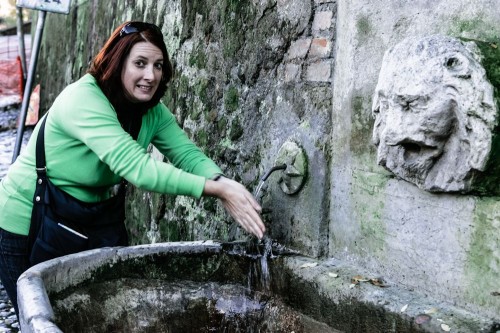
About Estelle Jobson
Estelle Jobson chose to leave a great job in South Africa to follow love and adventure to a life as “Signora Stella” in a quiet neighborhood on one of the highest hills of Rome. After more than dozen years working in all aspects of book publishing, she found herself tossed into the writing end of the business as she kept a journal of the joys, frustrations, and mysteries of life off the fast track in a country not her own. That journal became Finding Rome On The Map Of Love.
Life then led Estelle to Geneva where she once again has a busy day job. Her book, set in the seasons of Rome, is a fitting reminder that its good to take that unfamiliar path and Italy is the perfect place explore the map of love.
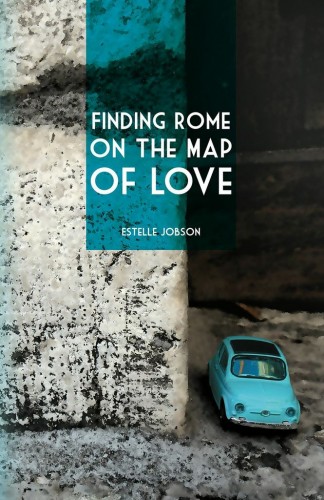
Finding Rome on the Map of Love
I loved the writing and the humor of Finding Rome on the Map of Love. Is this your first book and do you plan to write another?
Grazie! This is my first book, yes, although in my publishing career I have brought hundreds of books into the world for other authors. Right now, a great deal of creative energy goes into marketing Finding Rome, which deserves its rightful début. I wrote it over a year when I was a casalinga (housewife) and had the time and leisure to ruminate thoroughly and creatively. Such freedom and creative space is now limited by the otherwise very rewarding matter of earning a ‘proper’ income again. But I am brewing ideas on writing about a very different matter, women’s bodies and health, using humour to cloak information and provoke thought.
Your book is a meditation on assimilation (a South African expat in Italy). How long did you live in Rome and have you lived anywhere else in Italy?
‘Meditation’ is a good way of phrasing it, because living in Rome for 3 years gave me a chance to test-drive the mantra that emerges in Chapter 1: ‘You are enough. You have enough. You do enough.’ I managed to turn this into a way of life, effectively, even though now I am back in a conventional working life. I turned myself from a manic, frazzled career woman to a more balanced, less ambitious and considerably more contented person. This evolution is thanks largely to my time in Rome.
Have you traveled in Tuscany and do you have a favorite stop in Tuscany?
Yes, I have visited Florence itself, numerous times. I don’t have a specific spot that I love most. I travelled west to Livorno, and south down that coast, inland to Viterbo, and of course, back to Rome. Monte Argentario is spectacular, and I loved exploring the Etruscan ruins, from Tuscany to Lazio.
Do you have any observations about the difference between Florentines and Romans?
Yes, indeed! Apart from differences in vocabulary (e.g. schiacciata vs. pizza bianca), I would say the Florentines are generally a little more northern; meaning more reserved, and as they speak a ‘better’ Italian, more clearly enunciated, it is easier for me to understand. They say it themselves—their dialect is what Dante Alighieri formalized into what became standard Italian. I tried fiercely to get my head around the Roman dialect, but didn’t get much further than ‘Awu’ (hey), ‘Mo’ (now), and ‘Namo’ (Let’s go).
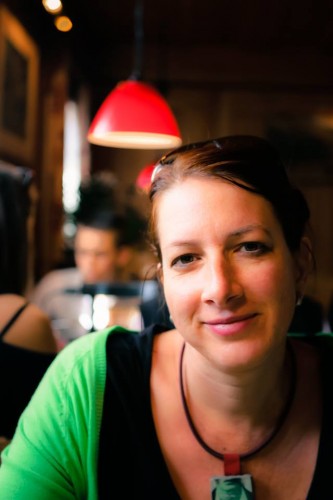
I love the Italian Food Rules (i.e. “no cappuccino after 10am”). What is your favorite Food Rule and why?
Olive oil, always, and butter very rarely. In this shift from butter to olive oil, I evolved from a blunt-palated anglosaxon to being able to discern a good olive oil from a splendid one. To this refining of my palate, I dedicated the chapter: ‘An ode to the olive’.
I am studying Italian Life Rules (i.e. colpo d’aria) right now and I found one in Finding Rome on the Map of Love that I had recognized subliminally, but never put a name to: Italians always wear bathrobes with hoods. What is your favorite Italian Life Rule?
I just love coprire la pancia (covering your stomach), which implies that one gets a nap in after lunch, with one’s tummy snugly covered. Accordingly, Italian men wear vests as a matter of course, and I adore this mélange of tenderness with masculinity: to ward off the peril of a chill on one’s tummy.
I read that you seem to enjoy learning languages. Which languages do you speak and in what order did you learn them?
Yes, learning languages has long been a hobby and a love of mine. I grew up in an English-speaking home, heaving with books. Afrikaans was taught in South African schools from quite early on and in high school, I started with French where my linguistic love affair really took off. At university, I did a pure-languages BA, majoring in French, English, and Xhosa (a South African language, Mandela’s mother tongue). As there were no additional fees involved at varsity, I did extra courses, German and beginner South Sotho (another African language). Only years later, in my thirties, did I start learning Italian after I met the man in question. But no, I don’t speak them all that well and sometimes I jumble them up.
Likewise, you seem to have wanderlust. Which countries have you lived in for more than six months and in what order, starting at birth?
Ooh, yes! ‘Sagittarius: have suitcase, will travel’. I grew up in Cape Town and, as an adult, moved to Johannesburg for my first job. In my early thirties, I studied in New York for 15 months, then lived in Geneva for 2.5 years, then went back to Joburg for 4.5 years. Rome came next, for 3 years, and 2.5 years ago, I returned to Geneva. It suits me much better the second time around.
Which country that you haven’t lived in would you like to try for six months to a year?
I am more attracted to cities, than countries, as such. Which cities? Paris (big) or perhaps Lyon (smaller). Frankfurt. Sydney. Seattle. Toronto. Chicago. London. Bombay. How many chances do I get?
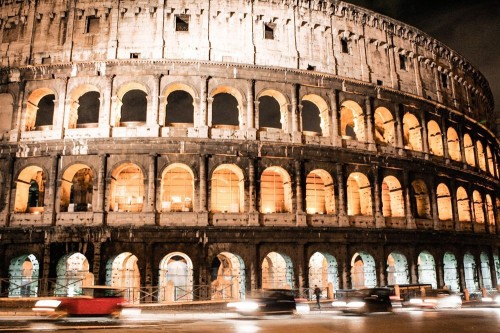
As a booklover, do you box up a library as you move from country to country or have you given in to an eReader or do you have another solution?
I do schlepp books around with me, but circumstances have forced me to become frugal. So I use local English libraries, buy used books from English church sales and the like, and then I swap with friends and colleagues. Occasionally, I donate books to public libraries or leave them in airports. I haven’t made the e-reader transition, because I love turning pages and I appreciate the mastery of a well-produced book.
Italy seems to lend itself to memoirs. You are now living in Switzerland. Is there a genre of expat-living-in-Switzerland memoirs? Can you see yourself writing one?
Italy has been the source of inspiration for numerous ‘travel’ writers, indeed, I think because Italy is such a total-immersion setting and so rich in quirky anecdotes, steeped in history. Such writing has not taken off in quite the same way in Switzerland, on the whole. Might this be because the Swiss are less loquacious and more inscrutable? In Geneva, which is more of a mini-global village, however, swissness is fairly diluted. My friends and colleagues hail from all corners of the globe. A few are even Swiss. In the course of a day at work, I may speak French, English, Italian, and maybe some rusty German. I don’t think writing about Switzerland is going to be my next writing project, however. I am keen to write about the landscape of the body.
You don’t describe in much detail about how your Italian partner (“the Metrosexual”) assimilated to South Africa. Do you think Italians assimilate when they move to another country?
On the whole, I don’t think first-generation Italians assimilate particularly well, no. Their children might, but those who are newly uprooted tend to stick to what they know and trust, that which is di fiducia. This includes brands, cuisine, and social familiarities, such as finding a local Italian butcher, hairdresser, shoemaker, and tailor. For example, try as I might, I could not persuade the Meterosexual that Disprin is just as good (no, identical to) aspirina. He made a tentative go at South African braais (barbecues), but was not able to keep up with the copious drinking marinated by the fierce African sun.
In the same vein, did “the Metrosexual” become “more” Italian when the two of you moved to Rome, and, if so, how?
I wrote about this process in ‘Love is like an artichoke’, about the slow peeling off and identifying of layers of identity. He did not change, but my ability to differentiate between what was him, what came from his family, what was Florentine, or broadly Italian (and then, which kind of Italian), became much more nuanced.
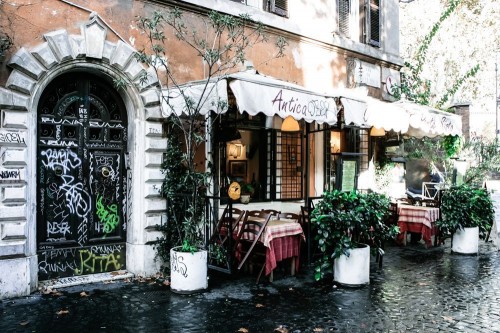
What was the germinating idea for your book Finding Rome on the Map of Love and what was its path to publication?
When I moved to Rome, I was free to not work for the first time in my adult life. This luxury was strangely unhinging too. Simultaneously, I was flung into a brand-new setting and was processing cross-cultural conundrums daily, which triggered a flood of creativity. I carried around notebooks and scribbled away madly, recording snippets of conversations, words, and observations of events around me. From that heap of chaos, I pulled out themes and wrote them up, one by one, chapter by chapter. I wrote 45 chapters over a year, each one under 2,000 words and set myself the goal of 70,000 words. In so doing, I processed my personal path and deepened my understanding of Italy.
You have written essays that have been published on Transitionsabroad.com on the topics relating to, in most part, navigating the bureaucracy of Italian life. Do you plan to create a book of those and other similar essays?
Transitionsabroad.com commissioned me to write how-to articles for ex-pats settling in Italy, which gave me a yet another opportunity to turn life’s experiences into writing. Feedback on internet-based writing is often immediate, direct, and gives me a bit of a thrill, so I have written a good number of pieces as a guest blogger, here and there. I have not thought of bundling them together, mostly because I regard writing for the internet as fast food and book publishing as fine dining.
Do you still drive a Vespa?
I have a Sym Tonik 125cc now, simply because the dealer was operating mid-summer. Guess where the Vespa dealer was? On holiday. In Italy! But actually, I ride my bicycle much more. I am looking forward to seeing myself being quoted as a ‘chic cyclist’ in a bike book (The Girls’ Bicycle Handbook: Everything You Need to Know About Life on Two Wheels) to be published next month.
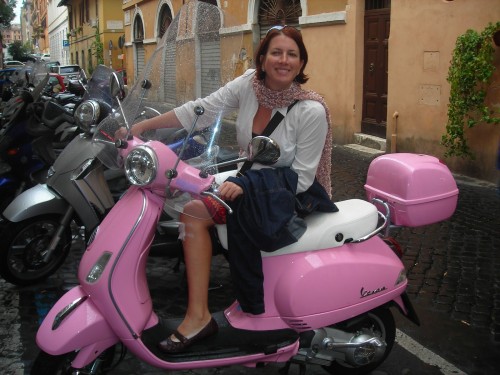
Do you still attend writing/publishing conferences? Which is your favorite and why?
On and off, yes. My favourite is the Frankfurt Book Fair, which is a mindboggling beehive of publishers, authors, exhibitors, and events. As Europe’s biggest book fair, it is 27 football fields worth of books and makes me feel, as a publishing person, that I am part of a vast, thriving, and magnificent world of ideas that become ink.
What is an Interrobang? What place does it play in your life and do you think it will find favor on Twitter?
The interrobang is a punctuation mark, merging an exclamation mark with a question mark. It was developed in the early days of printing and destined for great things, but did not thrive. The ‘?!’ conveys both surprise and questioning. No other punctuation mark in English communicates two emotive elements at once. Not being very on active on Twitter, I can’t rightly say which direction it might go in, but the interrobang would certainly fit well into the twittersphere. Bring it on!?

Ask and answer two questions that are not included here, which you think should be part of any interview with you.
Who is your favourite feminist?
Can I have two? Both of them think (thought) out of the box. Helen Keller was a lyrical and prolific writer. She mastered several languages, read widely, and was a vocal activist for women’s and workers’ rights. And then Inna Shevchenko, of Femen, who essentially turned a little known Ukrainian group of activist-intellectuals into an international movement. Their success lies in a particularly deft and radical move: having women write slogans of protest on their own bodies.
Who encouraged you most to write when you were young?
Lots of English teachers did. But at my high school, Will van der Walt, was the most emphatic and inspiring. He took my literary interests very seriously and bestowed the utmost respect upon the teenage angst I spilled out upon the page. You will see that I mentioned him in the Acknowledgements of my book.
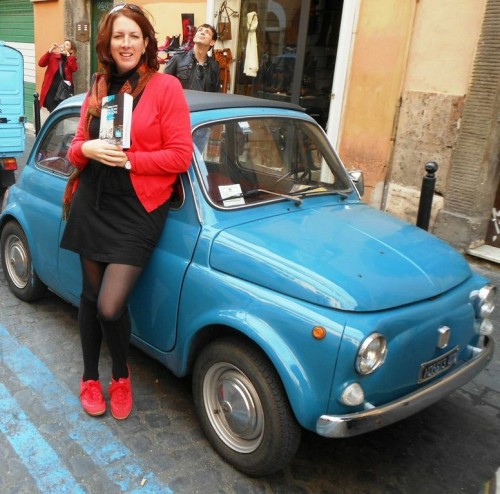
Book Give Away
Estelle will give a free copy of Finding Rome on the Map of Love to one lucky person who comments on this post with the best tale about a cultural misunderstanding they observed, heard about or experienced in Italy. Click the link below.
Update: Ansa Liebenberg won the free book for her comment and tale.
Buy Finding Rome on the Map of Love at:
